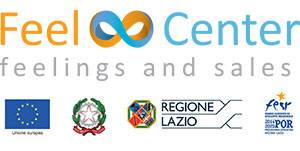Feel Center has identified three main target audiences for sales training courses
Sales networks and stores
The Feel Method has been applied with excellent results in sales training for agents, sales networks and shops.
The products and services of Art of Selling
Products and services on increasing turnover
Increasing sales while maintaining a high level of service quality and optimal staff harmony is an arduous but achievable goal.
Feel Centre has a special training module aimed at achieving these results, which is developed in three stages:
Key concepts in the sales approach :
Being a salesperson is a life choice
The salesman must have a high self-esteem
Teaching is also the best way of learning
Feel Centre builds sales-boosting projects with customers
Our instructors are coaches who teach through practical examples
Each concept, in order to be passed on to the students, must have proven itself, both in theory and in practice
Classroom activity is preparatory to field application
Learners must be emotionally involved: Feel training, besides providing a set of tools to achieve results, must be an engaging experience
Sales teaching is transmitted by intervening in the field and setting an example.
Only those with concrete sales expertise can teach new processes to salespeople
The value equation
Sale = Needs/Dreams – Risks – Efforts – Price
Another central concept of Feel Center concerns the development of mathematical formulas to accompany the training courses.
Various equations for salespeople have been devised and tested with a view to never losing focus on achieving the objective and passing on the method. One of these is the Value Equation, specific to sales performance.
Debt Recovery and NPL
Feel Center has a great deal of experience in training Credit Recovery operators and has won with its client Fides the Unirec (Consumers Union) award as best practice in training in the sector.
Feel Center helps the Debt Collection sector with techniques of persuasion psychology, Gentle Push (Nudge) and mathematics.
Call Center
Call centres represent very demanding work contexts, both for the pace of work and for the psychological implications of the relationships between people, customer and operator, who are not only physically distant from each other. Yet it is precisely in call centres, a place par excellence for relations between human beings, that an individual’s potential must be utilised, especially those linked to emotions, empathy, and imagination.
From the ‘call’ system to the ‘feel’ method, these are the objectives of the Call Centre Training Method:
Increase operators’ earnings
Enrich their tasks with content
Helping young people to embark on a path of professional and personal growth
Helping operators to better define their objectives
Stimulating skills transfer between operators
Monitoring results with kpi (key performance indicators)
Increase sales and thus the profits of companies in the sector and their principals
Improving corporate image
The benefits of our call centre training :
FOR THE OPERATORS
Learning a method also useful in other fields
Integrating personal goals with work
Deciphering and interpreting successes and failures
Learning to work in couples and teams
Enriching one’s own work by mentoring a colleague
Being part of a collaborative community
- Earning more
FOR THE COMPANIES
Fast improvement of results
Motivate and retain employees
Reduce selection and training costs
Being able to deploy an operator in heterogeneous assignments
Stimulating teamwork and skills transfer
Improving corporate image
Loyalising your customers
FOR CONTRACTORS
Improve results
Enhancing the benefits of the offer presented to customers
Being able to count on trained and homogeneous teams of operators
Improving service to the customer, who experiences a new buying experience
Improving corporate image
Acquiring useful information for new customer profiling
Building trust with partners
In order to provide training adapted to the company’s needs, first an in-depth analysis of the operators, the environment and the call centre management is carried out. This includes:
Scripts adopted and services offered
Methods adopted in customer care activities
- Techniques and emotional skills of employees
Working atmosphere and environment
Internal communication, with particular reference to management objectives
Capabilities and potential of leaders in relation to assigned tasks
Flow of operations and opportunities for process improvement
Operator feedback system
There are two routes for service in call centres, which can be provided simultaneously or in separate stages:
Call Center training for OUTBOUND
Call Center training for INBOUND
During and after completing the training modules, trainees will have the opportunity to try out the methods and techniques learned, through the Feel Coach service.
This is a remote training centre manned by trainers, to which practitioners and trainers will turn to do exercises on the Method, as if they were warm-up exercises before going on headphones.
The trainers will call the trainees by telephone, on speakerphone (to allow everyone to participate in the training experience), playing the role of the client in its possible variations: aggressive, tired, undecided, depressed, sceptical, etc.
At the end of the experience, the “trainer” will evaluate the operator and comment on its effectiveness, the techniques used, the opportunities taken or missed, providing immediate feedback to all trainees.
Why companies choose Feel Centre
Feeling & Sales Method ©
Engaging participative techniques
Constant presence in the field
Innovation and Technology
Service measurability and financeability
Feel Center
Digital platforms and innovative tools
Feel Center
trainings
Feel Center places emphasis on results.
For this reason, before each training project, it conduces an analysis by agreeing with the client on realistic and measurable goals to be achieved.
Projects are consequently implemented according to the client’s needs and characteristics, based on three areas of focus:

